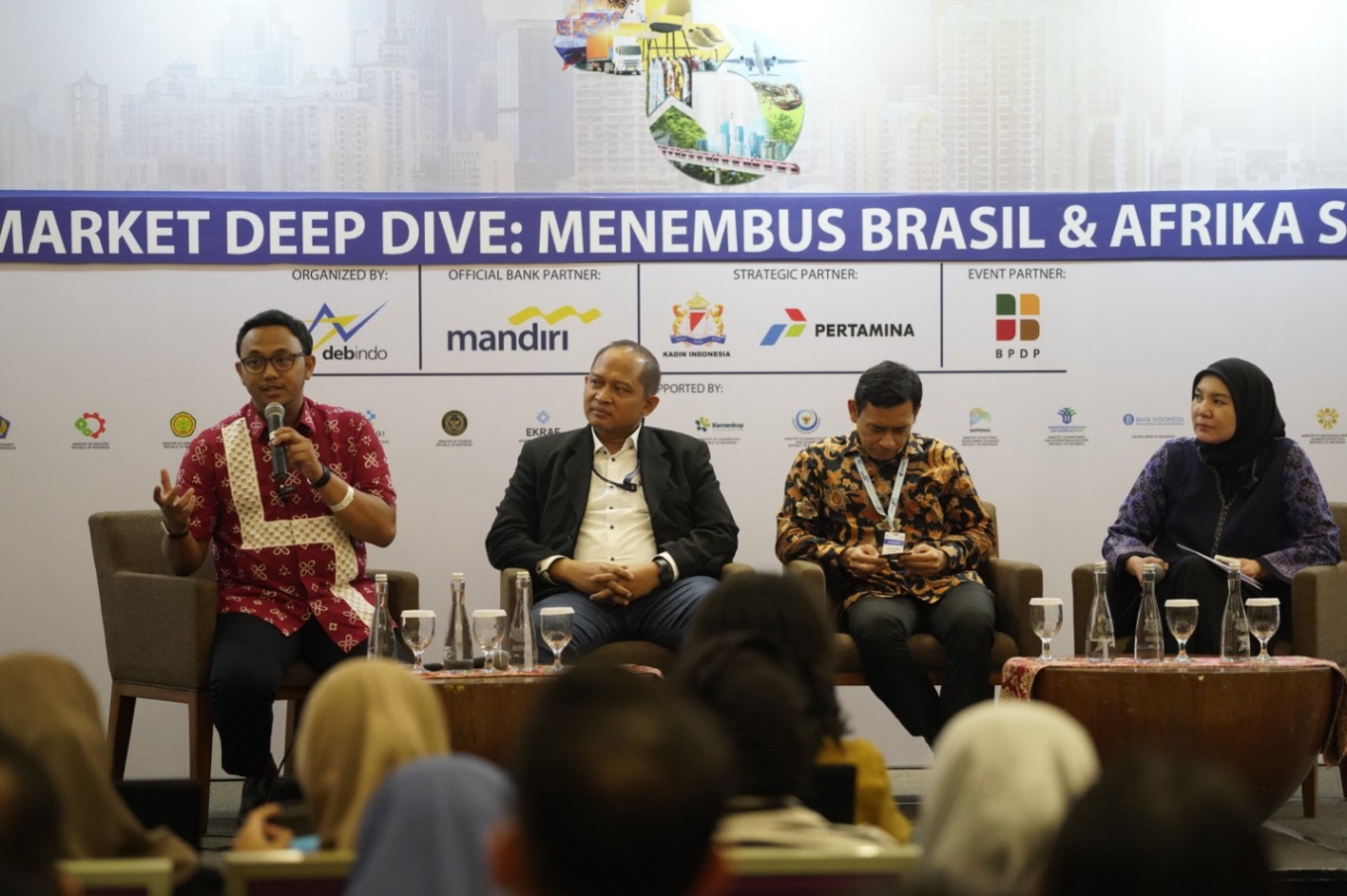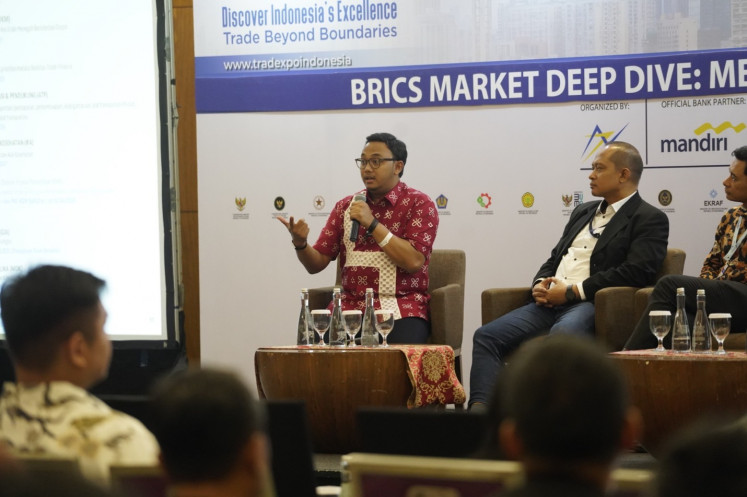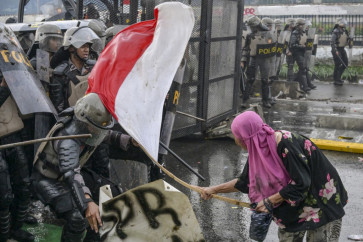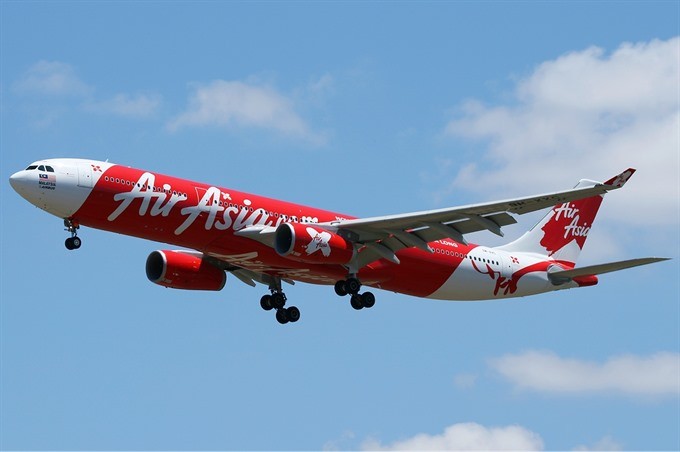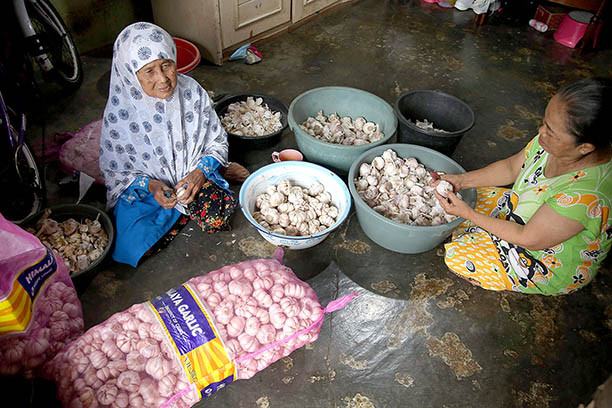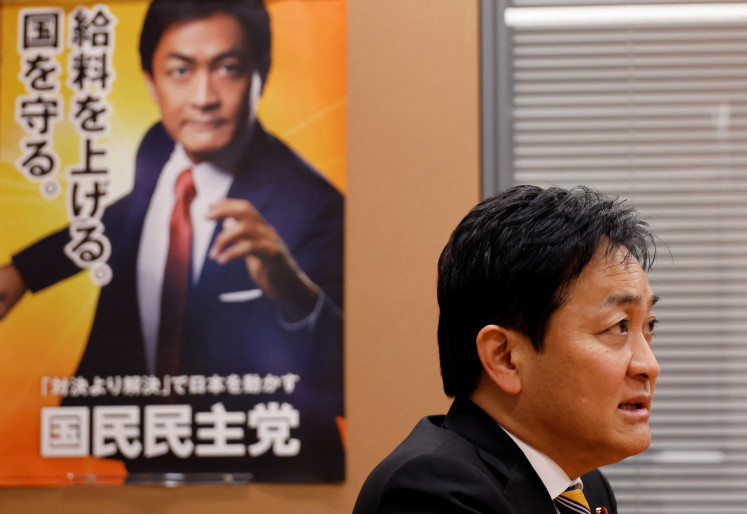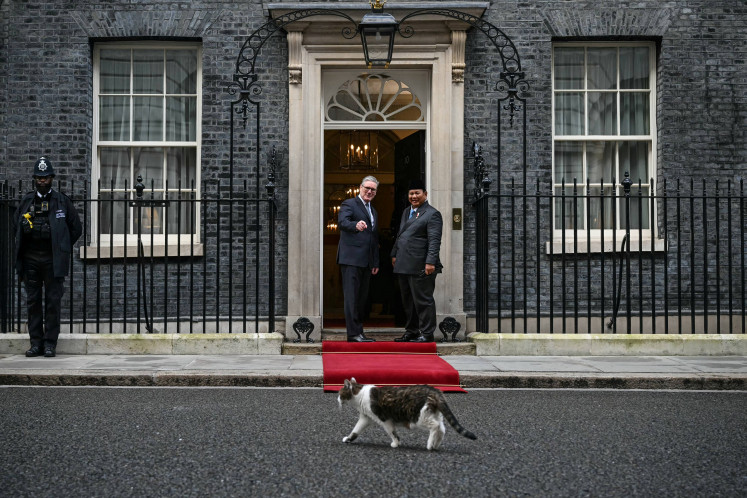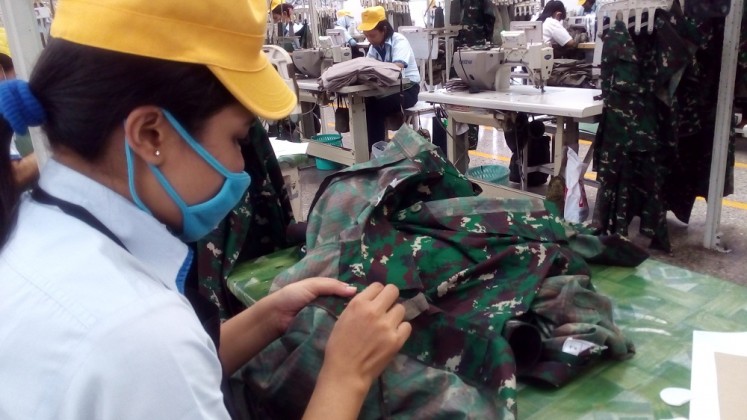Popular Reads
Top Results
Can't find what you're looking for?
View all search resultsPopular Reads
Top Results
Can't find what you're looking for?
View all search resultsLPEI business forum highlights BRICS market strategy for local exporters
Change text size
Gift Premium Articles
to Anyone
R
eaffirming its support for local businesses looking to expand into the global market, Indonesia Eximbank/Indonesian Export Financing Agency (LPEI) recently organized a business forum on how to enter the BRICS market.
Held on Oct. 16 as part of the Trade Expo Indonesia (TEI) 2025 series of events, the BRICS Market Deep Dive forum highlighted the rising power of the market, which includes Brazil, Russia, India, China, South Africa, Egypt, Iran, the United Arab Emirates (UAE) and Ethiopia, with Indonesia joining as a full member in January 2025.
Representing nearly 40 percent of global GDP and almost half of the global population, the BRICS bloc represents a major opportunity for local businesses looking for alternative markets.
Donny Tamtama, head of the Indonesia Trade Promotion Center (ITPC) São Paulo, noted that Brazil is the largest economy in Latin America, with data from Statistics Indonesia (BPS) showing that Indonesian exports to Brazil increased by 7.71 percent in a period from 2022 to 2024.
From 2022 to 2025, the main commodities imported into Brazil from Indonesia included processed palm oil and other vegetable oils, coal-based fuel (coke), motorcycle spare parts and car gearboxes, rubber-soled sneakers and printers.
In addition, ITPC São Paulo has received numerous inquiries for Indonesian products, particularly desiccated coconuts, cinnamon, cosmetics, furniture, instant noodles and cocoa powder.
”Our exports to Brazil for cocoa products have seen significant increases. Last year we recorded around US$900,000, while this year, up to the first semester, it was nearly $15 million,” Donny explained, adding that automotive parts, clothing and medical equipment were among other potentially lucrative commodities in demand.
However, he also outlined some of Brazil’s strict measures to protect its domestic industries, such as import tariffs for non-MERCOSUR products that average from 12 to 16 percent, multiple layers of domestic taxes, mandatory ANVISA (Brazilian Health Regulatory Agency) and INMETRO (National Institute of Metrology, Quality and Technology) certification as well as importer registration at Brazil’s Ministry of Development, Industry and Foreign Trade.
(Photos courtesy of Indonesia Eximbank)On the flip side, Donny continued, Indonesian businesses are still able to find a niche as Brazilian buyers are currently on the lookout for other suppliers outside of China, while the Brazilian government has asserted its readiness to begin the Indonesia-Mercosur CEPA talks.
Full governmental support
As a Special Mission Vehicle (SMV) under the Finance Ministry, the LPEI supports national export growth through national export financing (PEN), which covers conventional and sharia-based financing, guarantees and insurance. In addition, it also offers advisory services for export-oriented businesses, such as the Coaching Program for New Exporters (CPNE), business matching and rural community development initiatives.
Indonesia Eximbank’s National Interest Account (NIA) department head Agnes Rahadian stated that as Indonesia’s official export credit agency, Indonesia Eximbank carries a specific mandate from the government through a designated program for non-traditional market regions. This initiative, known as the NIA Region Program (Program PKE KWS), aims to provide alternative market destinations for exporters. The goal is to strengthen the international sales network and reduce its dependency on traditional/conventional markets. This program specifically targets regions like Africa, South Asia, the Middle East, Eastern Europe and Latin America.
The government, through the Finance Ministry’s NIA Secretary Committee, has allocated Rp 2.6 trillion (US$1567 million) for this particular program. The funding is designed for unlocking the market opportunities or to fill untapped sectors in the BRICS region.
“The NIA program from Indonesia Eximbank generally supports exporters through financing, guarantees and insurance schemes. The support not only offers competitive rates but also any other convenience schemes for exporters. Not only the Program PKE KWS, but the entire NIA program aims to boost the confidence of our business people to enter and compete in the global market,” Agnes told the audience.
Up to September, PKE KWS, supporting exporters to penetrate export destinations in Africa, South Asia, the Middle East, Eastern Europe and Latin America, had reached more than 50 countries, and the program had disbursed an accumulated amount of nearly Rp 10 trillion. The NIA program attempts to expand the reach of Indonesia’s leading products to potential markets, including markets in the BRICS region.
“For instance, we’ve financed vegetable oil and paper products to India. The same goes for Brazil, where vegetable oil still lead the sales. Furthermore, we have supported export projects to the African market, such as maritime patrol aircraft in Senegal, housing construction in Algeria and geotechnical survey services in Congo," Agnes explained.
Alongside the business forum, the LPEI brought 14 exporters to participate in the TEI 2025, spotlighting businesses that prioritize the principles of women's empowerment, are environmentally friendly and are committed to sustainability.

